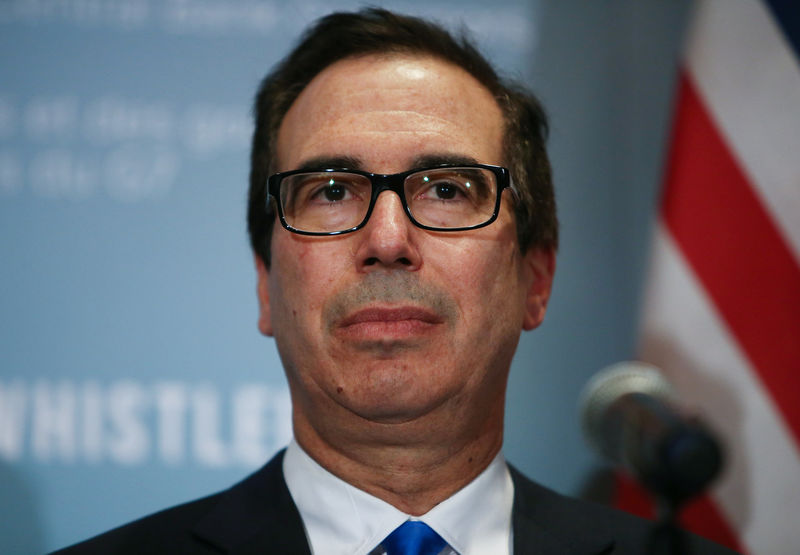By David Lawder
WASHINGTON (Reuters) - Conflicting signals from the Trump administration over proposed restrictions on foreign investment in U.S. technology companies, along with news that recently imposed import tariffs are starting to disrupt supply chains, sent global stock markets tumbling on Monday.
Proposed restrictions on foreign investment in U.S. technology would not just be confined to China, according to U.S. Treasury Secretary Steven Mnuchin. The forthcoming restrictions would apply "to all countries that are trying to steal our technology," he said.
The U.S. Treasury is due to issue its recommendations on Chinese investment restrictions on Friday.
Late Monday White House trade and manufacturing adviser Peter Navarro sought to downplay Mnuchin's remarks, telling CNBC television that the restrictions on investments in U.S. technology companies would just target China.
Benchmark Wall Street stock indexes suffered their worst losses in two months on Monday, while safe haven Treasury debt yields fell.
U.S. technology stocks were worst hit. Alphabet (NASDAQ:GOOGL), the parent of Google, fell 2.6 percent, Apple (NASDAQ:AAPL) lost 2.75 percent, and Amazon (NASDAQ:AMZN) dropped 3.0 percent.
TARIFFS IMPACT SUPPLY CHAINS
The recent imposition of import tariffs by the U.S., and counter-measures by other countries, are also starting to affect global production and supply chains. Some U.S. steel and aluminium tariffs went into effect in April and additional tariffs begin in July.
Harley-Davidson, the dominant player in the U.S. motorcycle market said on Monday it would not pass on the cost of EU tariffs to customers and instead focus on shifting some U.S. production to other countries.
Harley shares closed down 5.0 percent and analysts cut their profit forecasts on concerns about how quickly the company would be able to adapt to the 25 percent import duties the European Union began charging on June 22.
Other companies likely to feel the impact of recent U.S. tariffs on imported steel which raise costs for manufacturers, and the counter-measures by China which may hit U.S. exports, include heavy machinery maker Caterpillar (NYSE:CAT) and aircraft maker Boeing (NYSE:BA). Caterpillar stock lost 3.7 percent and Boeing fell 7.7 percent on Monday.
TRUMP ADMINISTRATION DIVISIONS
The conflicting signals on trade policy from the Trump administration reflect deep divisions among policymakers over how hard to push China on demands for changes in trade, technology transfers, and industrial policies.
U.S. Treasury Secretary Mnuchin has been reluctant to back steep tariffs on Chinese goods, fearing the impact on global supply chains. Goods assembled and exported in one country often depend on components manufactured in another, after being designed in yet a third country, making the national trade deficit focused on by President Trump an unreliable guide.
Last month, Mnuchin said a trade war with China was "on hold" after officials of the world’s two largest economies held talks in Beijing that were focused on opening more sectors of China's economy and increasing purchases of American goods.
But trade policy advisor Navarro, the administration's harshest China critic, has advocated a far more confrontational approach with Beijing.
“The market is perceiving that politics will become policy," said Brian Battle of Performance Trust Capital Partners in Chicago. "The market is starting to price in that the tariffs will start to become real. The rhetoric is getting stronger rather than weaker."
"A trade war means lower global GDP. It's bad for growth," he said.
CFIUS LANGUAGE
Derek Scissors, a China scholar at the American Enterprise Institute who consults regularly with the administration, said that he believes Mnuchin would prefer to apply the text of a bill working its way through Congress to strengthen national security reviews of U.S. acquisitions to investments by China.
The bill would allow the Committee on Foreign Investment in the United States (CFIUS) to review transfers of minority interests in companies dealing with critical infrastructure or critical technology as opposed to full acquisitions.
"I would not, on the investment side, be betting against the Treasury Department," Scissors said, noting that Treasury would control implementation of such rules.
Export controls, on the other hand, are the purview of the U.S. Commerce Department and the National Security Council. Trump administration officials have said they are considering the use of the 1977 International Emergency Economic Powers Act to impose new restrictions on China, an act widely used to freeze assets after the 9/11 attacks in 2001.
Spokespersons for the Treasury and the Commerce Department did not respond to requests for comment on their investment and export control plans.
On Wall Street, the Dow Jones Industrial Average fell 328.09 points, or 1.33 percent, to 24,252.8, the S&P 500 lost 37.81 points, or 1.37 percent, to 2,717.07, and the Nasdaq Composite dropped 160.81 points, or 2.09 percent, to 7,532.01.

Earlier policymakers in China moved quickly to temper any potential impact on economic growth from Beijing's trade dispute with the United States. Its central bank said on Sunday it would cut the amount of cash some banks must hold as reserves by 50 basis points to spur lending to smaller firms.